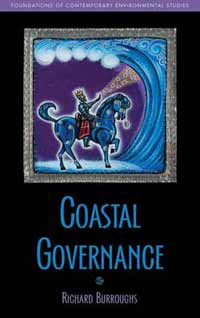 Author calls Deepwater Horizon oil spill “a failure of governance”
Author calls Deepwater Horizon oil spill “a failure of governance”
KINGSTON, R.I. – February 14, 2011 – Managing the often conflicting demands for using America’s coastlines is an increasing challenge, but a new book by a University of Rhode Island professor is shedding light on how policies are developed and implemented. The author said it’s a subject that all coastal residents should become more familiar with.
“To a certain extent, all coastal citizens are policy players already,” said Richard Burroughs, URI professor of marine affairs. “We watched the Deepwater Horizon drillship burn. We eat fish. We expect access to beaches. And the water that many of us flush goes to estuaries and bays. In short, the interests and needs of coastal citizens shape environments, and we need to improve our ability to further common interests concerning the coast.
“In addition, we will have to both enhance government and look beyond it for creative ways to fit human behavior within the natural limits of coastal environments,” he added.
 Burroughs’ new book, Coastal Governance, published by Island Press, examines the current thinking on such issues as fisheries, oil development, waste disposal, suburban sprawl, and other topics. Throughout the book, coastal citizens are challenged to determine how to improve existing policies.
Burroughs’ new book, Coastal Governance, published by Island Press, examines the current thinking on such issues as fisheries, oil development, waste disposal, suburban sprawl, and other topics. Throughout the book, coastal citizens are challenged to determine how to improve existing policies.
One of the biggest difficulties facing those charged with managing coastlines is the set of conflicting values that society holds.
“We are loving the coast to death,” said Burroughs. “We want easy access to unaltered beaches, but we also want to put our house on the beach, and that automatically triggers a problem. These conflicting emotions are not conducive to clear policy directives.”
According to Burroughs, the process of coastal management has changed considerably over the years. Initially it was conducted in a process called “sector-based management,” which focuses on managing a single activity – i.e. waste disposal, dredging, oil drilling – with insufficient recognition that single uses impact the environment and each other.
Today, many advocate ecosystem-based management, which recognizes trade-offs among uses in geographic areas, but also adds the realization that the combined impacts of uses must fit in with the environmental capacity of a natural system. “Ecosystem-based management may force the rethinking of many federal laws,” Burroughs said.
One example of the difficulties in managing coastal zones that Burroughs points to in his book is the recent Deepwater Horizon oil spill. He called the spill “a failure of governance.”
Burroughs said that the fundamental problem that resulted in the spill was the numerous conflicting functions that one agency was responsible for administering, among them the nation’s need for oil, the government’s desire to maximize revenue from that oil, and the desire for a clean and safe environment.
“It led to flawed decision making, and the loss of 11 lives and the disruption of millions of other lives,” Burroughs said. “It is clear that the system failed. The challenge to the administration now is how to separate those functions in a way that will lead to a higher degree of safety for people and the environment.”
Burroughs coauthored the marine pollution section of the 2003 Pew Oceans Commission report, and he has had scholarly articles published in Coastal Management, Maritime Policy and Management, Society and Natural Resources, and The Journal of Maritime Law and Commerce, among others. He serves on the Narragansett Bay Commission and the Mystic Seaport International Council.

